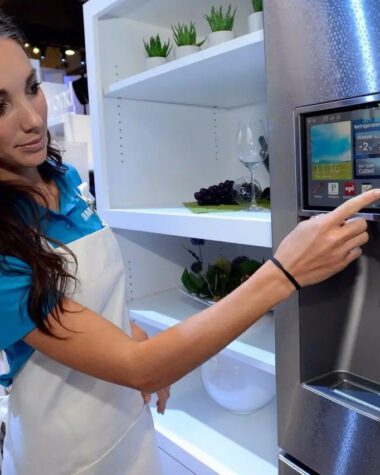A refrigerator is one of every American home’s most important kitchen appliances. According to Statista, around 118.2 million people, of which 35.1 million used two or more refrigerators. However, despite being a dependable piece of equipment, it is not invincible. Even the best-kept refrigerator eventually dies, taking your and then-spoiled milk.
Fortunately, you’re probably going to notice some early warning signs before your refrigerator does not work completely, and there are several things you can do that will extend its lifespan. So, for how long can a fridge last? We here at DaDongNY will be teaching you all you need to know.
For How Long Does The Refrigerator Last?
According to the 23rd Annual Portrait of the U.S. appliance industry, a refrigerator has a typical life expectancy of 10 to 18 years, but the average fridge has an average lifespan of about 14 years. However, the lifespan of a refrigerator varies depending on the type; therefore, simply base your choice on its age when you plan on buying a refrigerator.
Instead of relying on its age, use the operational condition of your refrigerator as your guide. Its parts deteriorate, increasing the likelihood of malfunctions ranging from bothersome noises to excessive ice buildup in the freezer compartment. The refrigerator may also decrease cooling effectiveness progressively, causing your electrical bills to increase.
Six Different Ways That You’re Shortening Your Refrigerator’s Lifespan
The breakdown of your refrigeration is inevitable, but understanding how you may be decreasing the life of your fridge allows you to stop poor behaviors so that those well-spent dollars travel further so you can use your equipment for longer than you think. They are as follows:
- You Haven’t Cleaned The Inside Mechanisms
If the defrost drain becomes clogged or frozen, the water slipping from the coils will overflow and leak underneath your refrigerator.
Not only may this overwork the refrigeration system, reducing its lifespan, but it also has the potential for the freezer and refrigerator to spill water throughout the kitchen floor. Any appliance that appears to be leaking should be inspected immediately.
- You Are Not Cleaning The Refrigerator
Any kind of dirt that lingers on the gasket of the refrigerator door for a considerable amount of time could break the seal of the refrigerator door. This could result in a leak, enabling cold air to pass through. This stresses the importance of learning how to properly clean your refrigerator.
Wipe off the door corners regularly to maintain your refrigerator in its excellent condition for as long as feasible. While you’re into it, check if you’ve organized the refrigerator properly to keep ingredients fresher while preventing food-related illness.
This May Also Interest You: Seal Your Worries Away With These Five Simple Steps For Replacing A Refrigerator Door Gasket
- You Do Not Clean The Coils
Dirt on the coils may hinder your refrigerator from efficiently expelling heat, causing your compressor to work harder and longer than it usually needs. This increases the energy consumption of your refrigerator and shortens its lifespan. As a result, we recommend cleaning it at least every six months.
This May Also Interest You: Five Refreshing Steps On How To Clean Your Refrigerator Condenser Coils
- You Don’t Change The Water Filter Frequently Enough
Suppose you have a refrigerator that generates ice and has a dispenser within the freezer or attached to the door. In that case, the water filter is essential for keeping this element of your refrigerator in good working order. An outdated, broken, or damaged water filter can cause a slew of issues for your refrigerator. In the worst-case scenario, your ice machine will break.
Furthermore, your refrigerator could overwork itself to death, leaving you to foot the expense of a new one. Fortunately, you are able to identify this issue early on since the ice cubes will start to come out smaller, weirdly shaped, or not at all.
- You’re Stockpiling It Too Much
Organizing your recently purchased foods from the store, we frequently stock them recklessly; however, always be mindful when stocking up and storing them. While this isn’t a major issue with modern models, certain older refrigerator models feature fewer insulated fan blades.
Filling items in both the freezer and refrigerator to the point of placing excessive stress on their tiny compartment can change their shape and fitting among connected sections of your refrigerator, potentially resulting in damage. Ineffective refrigerators are overworked refrigeration units, eventually resulting in a refrigerator that fails to function properly. In order to prevent overfilling the refrigerator, conduct a thorough cleaning of the contents every other day and reduce clutter.
- Your Freezer’s Temperature Is Far Too High
The temperature should ideally be set between zero and five degrees Fahrenheit. The improper freezer temperature can shorten the life of your ice maker and compromise the well-being of the food you’ll be consuming. A temperature above 15 °F could also trigger the defrost thermostat to cease operating, causing your refrigerator to overwork and decrease its life.
This May Also Interest You: Why Should The Refrigerator And Freezer Be This Cold (A Guide)
Seven Warning Signs That Your Refrigerator Is Declining
As you mistreat your refrigerator, you’ll discover symptoms that it’s about to fall apart. While certain problems can be addressed, replacement is the only option if that fails. Here are seven warning signals of impending breakage:
- Your Refrigerator Is More Than Ten Years Old
As previously said, the average refrigerator has a lifespan of 10-18 years, and if you still have it within the first half of that span, you should have enough time to use it before buying a new replacement. If it’s near the peak of that span, it’s probably on its final stretch.
Refrigerator seals and gaskets may wear out and break as time passes, allowing drafts of warm air to pass through, thus causing food to deteriorate faster. You might additionally be expending a greater amount of energy than is needed. In such a scenario, it could be time for you to begin looking for a new refrigerator.
- Your Refrigerator Is Really Loud
If your refrigerator seems to be making more noise than it normally should, it might be an indication that it is on its final stretch of life. This could result from a faulty motor, compressor, or fan blade. If you notice loud noises, you should have an authorized technician examine your refrigerator. If the problem is with the engine or compressor, repairing it might be pricey, so replacing it with a new one might be better.
- Your Refrigerator Is Exceptionally Quiet
If your refrigerator is unusually quiet, it may be a telltale sign that there’s something wrong with it. While a quieter refrigerator can be beneficial, excessive quietness could indicate that the compressor has stopped working. If you see this, have someone with expertise inspect your refrigerator.
- Food Begins To Spoil Before Its Expiration Date
If your food spoils quicker than it should, it is likely because your refrigerator doesn’t cool everything inside efficiently. A malfunctioning thermostat or damaged gaskets are possibly the ones to blame. That being said, get an experienced mechanic to assess your refrigerator and provide guidance on the best line of action.
- Excess Ice In The Refrigerator Or Freezer
Any ice accumulation in your freezer or refrigerator compartment could suggest that the defrost timer or thermostat is malfunctioning. If the thermostat cannot control the temperature, the freezer may become too chilly, and ice could develop.
With this, food will spoil faster. Therefore, regularly maintaining your refrigerator and ensuring it is properly cooling is critical.
- Refrigerator Condensation
Condensation on the outside of the refrigerator may suggest that its gaskets are worn and cannot provide enough sealing. This allows warm air into the refrigerator, leading to food spoilage.
It is of the utmost importance for you to have a skilled technician evaluate your refrigerator to figure out if the rubber gaskets need to be replaced.
- The Back Of The Refrigerator Is Quite Hot To The Touch
Because the engine is positioned in the back of most refrigerators, the back seems warmer than the front, but if the interior feels hot upon contact, this can indicate a problem. Dirty condensers outside the unit decrease airflow, producing more heat development inside; weak electrical connections within coils or fan motors and congested vent holes limit air circulation out of the unit are also potential contributors.
How to Extend the Life of Your Refrigerator
Though refrigerators typically survive roughly 18 years, they can be extended. It all comes down to regular upkeep. Given that certain refrigerator repairs might cost as much as an entire replacement, it’s important to stay away from problems from occurring. Make use of these tips:
- Make Some Room In Your Fridge
Only some have an enormous kitchen space in their homes. Now, it may be tempting to use the top of your refrigerator as additional space for storage, but this appliance requires some room to evaporate heat. Maintain a 1-inch distance between the cabinets and the top of your refrigerator.
- Maximize Your Warranty
The majority of refrigerators come with a one-year guarantee. Check the operation of your refrigerator before the warranty expires. If your refrigerator is faulty, ship it back as soon as possible for a replacement.
- Doors Should Be Cleaned And Lubricated
The gasket around your door can break, warp, or loosen with time. When this occurs, your refrigerator begins to leak cold air. To keep your fridge running smoothly, clean and grease the gaskets by applying just a small amount of petroleum jelly.
- Condenser Coil Cleaning
Condenser coils are an important part of any refrigerator unit. Unfortunately, they also serve as a dirt magnet, and filthy coils may cause the refrigerator to overheat. Clean your condenser coils once or twice a year with a bristle brush and a vacuum cleaner with a wand attachment.
- Don’t Fill Your Fridge Too Much
Every fridge-freezer pair has vents inside to help with proper air circulation. They are typically seen on the refrigerator’s walls or the freezer ceiling. Although individuals enjoy a well-stocked refrigerator, don’t overfill it to the extent of blocking these essential vents. Otherwise, extra moisture, frost buildup, inconsistent cooling, and an overworked engine could result.
- Replace The Water Filter
Only some refrigerators include a water dispenser or an ice maker. If it does, the water filter will aid in the removal of pollutants and bacteria that are present in the water that you drink. Make a point of changing it every six months or so. This should cost, at most, $57 each year.
When Should You Purchase A New Refrigerator
When a refrigerator fails, the results can be tragic and expensive. Imagine having food spoilage, an accumulation of ice on shelves and other equipment sections, excessive electricity consumption, or less efficiency owing to defective components.
Taking suitable action as soon as possible will save you from these and other issues. If you see any of the warnings above flags in your refrigerator and repairs are too expensive or ineffective, it’s time to start looking for a replacement.
When purchasing a new refrigerator, numerous variables exist, such as its size, features, and price. You should also consider the type of food you’ll be storing and how much energy you’ll use. Consider purchasing an Energy Star-certified refrigerator if you want a more energy-efficient model.
Personal tastes must also be considered while selecting a refrigerator model. For example, if you need more storage space, search for a model with flexible shelves and door bins. If you prefer a more aesthetically beautiful model, choose one that sports a stainless-steel finish or a French door refrigerator.
Another critical factor is the budget. While larger and more feature-rich refrigerators can turn out to be more expensive. However, there are still lots of cheaper options available. If you have a limited budget, opt for a refrigerator with basic features that can accommodate all your food.
What Is The Price Of A New Refrigerator?
According to Synchrony, replacing a refrigerator costs $500 to $12,000. Because there are so many different types and brands, there is a wide variety of pricing. A high-end stainless-steel smart fridge can cost thousands more than a simple fridge-freezer combo.
However, the average consumer spends between $1,000 and $2,000 on a new refrigerator. There are solutions to suit most budgets. All you have to do is shop around.
FAQs
- Is It Worth Fixing A 10-Year-Old Refrigerator?
If your refrigerator is over a decade old and requires more than just a small repair, it’s economical to replace it rather than repair it. The average fridge repair costs around $250. However, expenses might approach $1,000, according to Forbes. That’s nearly the price of a new standard refrigerator.
This May Also Interest You: Counter-Depth Refrigerators: A User’s Guide
- Is It Time For Me To Get Rid Of My 20-Year-Old Refrigerator?
When your 20-year-old refrigerator is still in good working order and hasn’t demanded a growing list of repairs, it’s probably better off replacing it with a new one.
While you could potentially get an additional five years to use it in the best-case scenario, it’s better to start looking around and establishing a budget immediately. You want to be prepared because you will probably require a new refrigerator sooner rather than later.
- When Is The Right Moment For Getting A New Refrigerator?
The ideal time to shop for a new refrigerator is before the one you currently have fallen apart. So, assess whether there are any indications or signals that a refrigerator is about to break down and prepare to get one before you need one.
Due to current difficulties in the supply chain, the model you want may be available for only a few months. Appliance bargains are generally available over holidays if you simply wish to update your model.
- Which Refrigerator Brands Have The Longest Lifespan?
Refrigerators with freezers on the top or bottom have historically lasted the longest, and those from recognized refrigerator brands such as Whirlpool and LG typically cut for the most trustworthy. Also, remember that the fewer components that can fail, the longer the model can, in theory, survive while costing less to be fixed.
Bottomline
A working refrigerator is an essential feature of any kitchen, and it is necessary to spot indicators that your fridge is on its final days. You can guarantee that your refrigerator functions effectively and consistently for years by being aware of these indicators and taking the required steps to extend its life.
With the in-depth fridge guide regarding their lifespan and various blog pieces on our fridge catalog, you’ll be able to get all you need, including answers to any queries you may have about your equipment. We’d like to leave you with an understanding that you can select the ideal refrigerator for your household with adequate research and planning.
To learn more about refrigerators and how this valuable piece of equipment chills the food and beverages inside, including your breast milk, check out the post here.
Articles You May Be Interested In
- A Cooler Choice: Whirlpool v.s GE Refrigerators (Full Guide)
- Refrigerator Check: LG v.s Samsung Refrigerators (Full Guide)
- Cool Tech Showdown: Frigidaire v.s Whirlpool Refrigerators (Full Guide)
- Fridge Favorites: Bosch v.s LG Refrigerators (Full Guide)
- Cooling Conundrum: Whirlpool v.s Samsung Refrigerators (Full Guide)
- Tale Of The Tape: Maytag v.s Whirlpool Refrigerators (Full Guide)
- Fridges in Focus: Thermador v.s Sub-Zero Refrigerators (Full Guide)
- Fridge Frenzy: Sub-Zero v.s Viking Refrigerators (Full Guide)
- The Big Chill: Whirlpool v.s KitchenAid Refrigerators (Full Guide)
- Refrigerator Bout: Whirlpool v.s LG Refrigerators (Full Guide)









